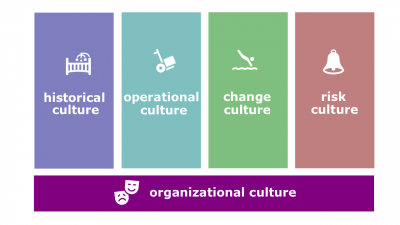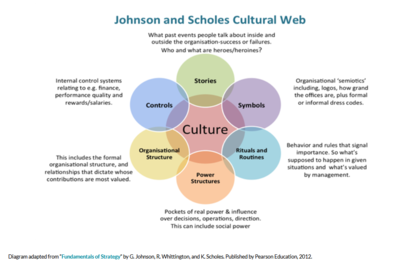Difference between revisions of "Organizational culture"
(→Definitions) |
(→Cultural web) |
||
| (7 intermediate revisions by the same user not shown) | |||
| Line 23: | Line 23: | ||
:''Main wikipage: [[Gods of management]] | :''Main wikipage: [[Gods of management]] | ||
| + | :In his book, [[Gods of Management by Handy|Gods of Management: The Changing Work of Organizations]], [[Charles Handy]] uses four Greek gods to illustrate four approaches that managers can utilize to build the ''Culture'': | ||
| + | :#Zeus-led or "club" organization values the power that spreads throughout the company from a top boss. | ||
| + | :#Apollo-led organization is a bureaucracy; it is based on [[role]]s. | ||
| + | :#Athena-led organization emphasizes problem-solving; it is based on projects and tasks. | ||
| + | :#Dionysius-led organization tries to put its professionals before its management to free their initiative. | ||
| + | :''Charles Hardy'' advocated managers to be aware of these [[gods of management]] to choose those that fit the organization best. | ||
| − | + | ===Quotes=== | |
| − | + | :*[[Peter Drucker]]: Culture eats strategy for breakfast. | |
| − | |||
| − | |||
| − | |||
| − | |||
| − | |||
| − | |||
| − | |||
| − | |||
| − | |||
| − | |||
| − | |||
| − | |||
| − | |||
| − | |||
| − | |||
| − | |||
| − | |||
| − | |||
| − | |||
| − | |||
| − | |||
| − | |||
| − | |||
| − | |||
| − | |||
| − | |||
| − | |||
| − | |||
| − | |||
| − | |||
| − | |||
| − | |||
| − | |||
| − | |||
| − | |||
| − | |||
| − | |||
| − | |||
| − | |||
| − | |||
| − | |||
| − | |||
| − | |||
| − | |||
| − | |||
| − | |||
| − | |||
| − | |||
| − | |||
| − | |||
| − | |||
| − | |||
| − | |||
| − | |||
| − | |||
| − | |||
| − | |||
| − | |||
| − | |||
| − | |||
| − | |||
| − | |||
| − | |||
| − | |||
| − | |||
| − | |||
| − | |||
==Components== | ==Components== | ||
| Line 103: | Line 42: | ||
===Cultural web=== | ===Cultural web=== | ||
| − | :With regard to its | + | :''Main wikipage: [[Cultural web]] |
| + | |||
| + | :[[File:Cultural-web.PNG|thumb|400px|right|[[Cultural web]]]]With regard to its drivers, Johnson and Scholes have identified the six elements, | ||
| + | :#Stories and myths. | ||
| + | :#Rituals and routines. | ||
| + | :#Symbols. | ||
| + | :#[[Organizational structure]]. | ||
| + | :#Control systems. | ||
| + | :#Power structures. | ||
| + | :All of these elements contribute to the cultural web core. Johnston and Scholes call this "core" "the paradigm" or "the recipe." | ||
==Related concepts== | ==Related concepts== | ||
Latest revision as of 01:36, 25 April 2021
Organizational culture (alternatively known as corporate culture; hereinafter, the Culture) is a system of the shared meaning, mental models, principles, traditions, values, and ways of doing things held by members of the organization that influence the way organizational members act and that distinguish the organization from other organizations.
Contents
Trivia
Definitions
According to Organizational Behavior by Robbins and Judge (17th edition),
- Organizational culture. A system of shared meaning held by members that distinguishes the organization from other organizations.
According to Management by Robbins and Coulter (14th edition),
- Organizational culture. The shared values, principles, traditions, and ways of doing things that influence the way organizational members act and that distinguish the organization from other organizations.
According to Marketing Management by Keller and Kotler (15th edition),
- Corporate culture. The shared experiences, stories, beliefs, and norms that characterize an organization.
According to the Corporate Strategy by Lynch (4th edition),
- Organizational culture. The set of beliefs, values and learned ways of managing in an individual organization. Note that it is important to distinguish this from national cultures.
According to the Strategic Management by David and David (15th edition),
- Organizational culture. A pattern of behavior developed by an organization over time as it learns to cope with its problem of external adaptation and internal integration, and that has worked well enough to be considered valid and to be taught to new members as the correct way to perceive, think, and feel in the firm.
According to the HRBoK Guide,
- Corporate culture. The beliefs and behaviors of an organization. The values, language, rules, procedures, expectations, and processes that affect how employees of an organization think, act, and view the world.
Types
- Main wikipage: Gods of management
- In his book, Gods of Management: The Changing Work of Organizations, Charles Handy uses four Greek gods to illustrate four approaches that managers can utilize to build the Culture:
- Zeus-led or "club" organization values the power that spreads throughout the company from a top boss.
- Apollo-led organization is a bureaucracy; it is based on roles.
- Athena-led organization emphasizes problem-solving; it is based on projects and tasks.
- Dionysius-led organization tries to put its professionals before its management to free their initiative.
- Charles Hardy advocated managers to be aware of these gods of management to choose those that fit the organization best.
Quotes
- Peter Drucker: Culture eats strategy for breakfast.
Components
Application areas
- With regard to its application areas, every Culture can be divided in four parts:
- historical organizational culture or the culture envisioned by the founders and others that is no longer executed,
- operational culture or the culture exercised by an enterprise today for its operations,
- change culture or the culture related to change in the enterprise, and
- risk culture or the culture related to handling risks.
Cultural web
- Main wikipage: Cultural web
- With regard to its drivers, Johnson and Scholes have identified the six elements,
- Stories and myths.
- Rituals and routines.
- Symbols.
- Organizational structure.
- Control systems.
- Power structures.
- All of these elements contribute to the cultural web core. Johnston and Scholes call this "core" "the paradigm" or "the recipe."
Related concepts
- Strong organizational culture. An organizational culture in which the key values are intensely held and widely shared.
- Positive organizational culture. An organizational culture that emphasizes building on employee strengths, rewards more than punishes, and emphasizes individual vitality and growth.
- Organizational subculture. A miniculture within an organization, typically defined by department designations and geographical separation.

